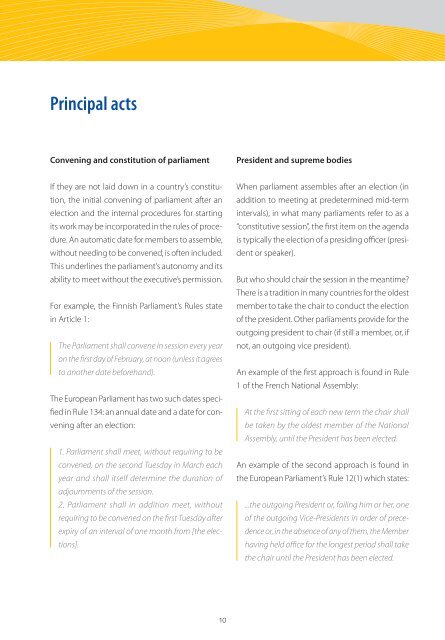Parliamentary Rules of Procedure - European Parliament - Europa
Parliamentary Rules of Procedure - European Parliament - Europa
Parliamentary Rules of Procedure - European Parliament - Europa
You also want an ePaper? Increase the reach of your titles
YUMPU automatically turns print PDFs into web optimized ePapers that Google loves.
Principal acts<br />
Convening and constitution <strong>of</strong> parliament<br />
if they are not laid down in a country’s constitution,<br />
the initial convening <strong>of</strong> parliament after an<br />
election and the internal procedures for starting<br />
its work may be incorporated in the rules <strong>of</strong> procedure.<br />
an automatic date for members to assemble,<br />
without needing to be convened, is <strong>of</strong>ten included.<br />
This underlines the parliament’s autonomy and its<br />
ability to meet without the executive’s permission.<br />
For example, the Finnish <strong>Parliament</strong>’s <strong>Rules</strong> state<br />
in article 1:<br />
The <strong>Parliament</strong> shall convene in session every year<br />
on the first day <strong>of</strong> February, at noon (unless it agrees<br />
to another date beforehand).<br />
The <strong>European</strong> <strong>Parliament</strong> has two such dates specified<br />
in Rule 134: an annual date and a date for convening<br />
after an election:<br />
1. <strong>Parliament</strong> shall meet, without requiring to be<br />
convened, on the second Tuesday in March each<br />
year and shall itself determine the duration <strong>of</strong><br />
adjournments <strong>of</strong> the session.<br />
2. <strong>Parliament</strong> shall in addition meet, without<br />
requiring to be convened on the first Tuesday after<br />
expiry <strong>of</strong> an interval <strong>of</strong> one month from [the elections].<br />
10<br />
President and supreme bodies<br />
When parliament assembles after an election (in<br />
addition to meeting at predetermined mid-term<br />
intervals), in what many parliaments refer to as a<br />
“constitutive session”, the first item on the agenda<br />
is typically the election <strong>of</strong> a presiding <strong>of</strong>ficer (president<br />
or speaker).<br />
But who should chair the session in the meantime?<br />
There is a tradition in many countries for the oldest<br />
member to take the chair to conduct the election<br />
<strong>of</strong> the president. Other parliaments provide for the<br />
outgoing president to chair (if still a member, or, if<br />
not, an outgoing vice president).<br />
an example <strong>of</strong> the first approach is found in Rule<br />
1 <strong>of</strong> the French national assembly:<br />
At the first sitting <strong>of</strong> each new term the chair shall<br />
be taken by the oldest member <strong>of</strong> the National<br />
Assembly, until the President has been elected.<br />
an example <strong>of</strong> the second approach is found in<br />
the <strong>European</strong> <strong>Parliament</strong>’s Rule 12(1) which states:<br />
...the outgoing President or, failing him or her, one<br />
<strong>of</strong> the outgoing Vice-Presidents in order <strong>of</strong> precedence<br />
or, in the absence <strong>of</strong> any <strong>of</strong> them, the Member<br />
having held <strong>of</strong>fice for the longest period shall take<br />
the chair until the President has been elected.

















